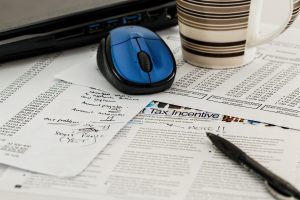Helpful information for your 2020 tax return

2020 has certainly been an eventful year however the need to do our tax return remains the same. The team at Infocus Tax & Business Advisory has put together some important tips that may assist you as you begin to prepare your 2020 tax return.
Don’t lodge your return too early!
The ATO has advised people to wait until the end of July before lodging returns to help minimise errors. Each year a significant number of returns are delayed or result in a tax payment being due because some income details have been left out of the return. It’s important to ensure your employer has finalised the information in your income statement before you lodge your return. Other information provided by banks, government agencies and health funds will automatically be inserted into your tax return, and this is generally completed by the end of the July.
Early super withdrawals
The ATO has also warned that members who took money out of their superannuation accounts without meeting the eligibility requirements could face fines and prosecution.
Tax tips for employees
JobKeeper & JobSeeker payments
If you are an employee receiving JobKeeper payments from your employer these are not reported separately and will be included in your Payment summary provided by your employer.
JobSeeker payments are included automatically in the pre-filled return form. Make sure this information has been processed before lodging your return.
If you have been made redundant or stood down
If you take leave or are temporarily stood down, your employer may pay you regular payments or make a one-off payment. Your employer may give your payment a special name such as:
-
- stand-down payment
- COVID-19 payment
- pandemic allowance.
Regardless of what your employer calls these payments, the ATO treats them the same as your usual payments from your employer.
If your employment is terminated you may receive payments from your employer. These payments can have up to three parts:
1. tax-free
2. concessionally taxed (taxed at a lower rate than your marginal tax rate)
3. taxed at your usual marginal tax rates.
The tax rate depends on the type of payment. Please contact us if you require assistance understanding your redundancy payment and tax obligations.
Claim work-related deductions
Claiming all work-related deduction entitlements may save considerable income tax, however it’s important to understand the rules as the ATO has signaled increased scrutiny and audit activity in this area. Typical work-related expenses include employment-related mobile phone, internet usage, computer repairs, union fees and professional subscriptions that the employee paid themselves and for which they were not reimbursed.
To claim a deduction for a work-related expense:
• you must have spent the money yourself and weren’t reimbursed
• the expense must be directly related to earning your income
• you must have a record to prove it.
If there was a private component, you can only claim a deduction for the work-related portion of the expense.
For more information, please visit the ATO’s ‘Deductions you can claim’ web page
Claim home office expenses
There are three methods you can use to claim:
1. Actual cost method:
Under the actual expenses method, you can claim the additional running costs you directly incur as a result of working from home.
2. Fixed rate method:
You can claim a deduction of 52 cents for each hour you work from home for the work-related expenses you incur for additional running expenses.
3. Shortcut method:
You can claim a deduction of 80 cents for each hour you worked from home from 1 March to 30 June 2020 as long as you:
-
- are working from home to fulfill your employment duties and not just carrying out minimal tasks such as occasionally checking emails or taking calls
- have incurred additional running expenses as a result of working from home.
For more information please go to the ATO Home office deductions web page.
Claim a deduction for superannuation contributions
Claiming a tax deduction for personal superannuation contributions is no longer restricted to the self-employed. The rules changed on 1 July 2017 and anyone under the age of 75 can claim contributions made from their after-tax income to a complying superannuation fund as fully tax deductible in the 2019-20 tax year. Other eligibility criteria apply. Any contributions you claim a deduction on can count towards your concessional contribution cap. To claim the deduction, you will first need to lodge a notice of intent to claim or vary a deduction for personal contributions form with your superannuation fund by the earlier of the day you lodge your tax return or the end of the following income year.
More information on income and deductions for individuals can be found on the ATO website.
Tax tips for investors
Check your rental property deductions
The ATO has received a large boost in funding to close the multi-billion individuals’ tax gap. Part of its focus is to ensure taxpayers are reporting all rental income as well as claiming only the rental property expenses to which they are entitled. Some of this additional funding will go to improving the checking of claims in real time, additional audits and prosecutions. The ATO receives details from Airbnb and other providers which will be data matched against tax returns.
For more information, please refer to the ATO’s guide for residential rental properties.
Correctly report any gains or losses from cryptocurrencies
The ATO is now matching transaction data obtained from digital exchanges, so it is more important than ever that you ensure cryptocurrency gains and losses are correctly reported. If you either currently are or have been involved in acquiring or disposing of cryptocurrencies in the past, you need to be aware of the income tax consequences. These vary depending on the nature of your circumstances.
Check your foreign investments
If you are an Australian resident with overseas assets, you need to include any capital gains or capital losses you make on those assets in your tax return and may have to include income you receive from overseas interests in your tax return. Please be aware that the ATO has information exchange agreements with revenue authorities in many foreign jurisdictions, and therefore may receive data on any of your overseas investments and income.
Tax tips for small business and sole traders
JobKeeper payments
If you are a business who has received JobKeeper payments, you need to include the payments as business income in your tax return.
Don’t forget the instant asset write-off
Under the instant asset write-off, eligible businesses can claim an immediate deduction for the business portion of the cost of an asset in the year the asset is first used, or installed ready for use (2). The thresholds and eligibility have changed over time with the most recent changes including:
From 12 March 2020 until 31 December 2020 the instant asset write-off:
-
- threshold amount for each asset is $150,000 (up from $30,000)
- eligibility has been expanded to cover businesses with an aggregated turnover of less than $500 million (up from $50 million).
From 1 January 2021 the instant asset write-off will only be available for small businesses with an aggregated turnover of less than $10 million and the threshold will be $1,000.
Note: For eligible businesses with an aggregated turnover from $10 million to less than $500 million, the $150,000 threshold applies for assets purchased from 7.30pm (AEDT) on 2 April 2019 but not first used or installed ready for use until 12 March 2020 to 31 December 2020.
Check your company tax and imputation rates
Most companies with an aggregated annual turnover of less than $50 million will pay tax at 27.5 per cent in 2019-20 (3). However, some companies with a turnover below $50 million will continue to pay tax at 30 per cent, especially companies that earn nearly all their income from passive investments such as rental income or interest income.
For more information please refer to the ATO Company tax web page.
Check if the personal services income rules apply
Personal services income (PSI) is income produced mainly from your personal skills or efforts as an individual. You can receive PSI even if you’re not a sole trader. If you’re producing PSI through a company, partnership or trust and the PSI rules apply, the income will be treated as your individual income for tax purposes. If the PSI rules apply, they can affect how you report your PSI to the ATO and the deductions you can claim.
Need advice?
If you have any questions about your tax return please don’t hesitate to contact us and we will happily help you navigate the process.



